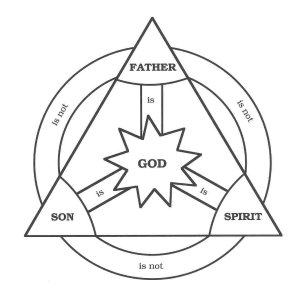What is often used as a defense against the Trinity is the oft repeated in Scripture, "God is one."
There is a historical application in gathering the meaning of that true declaration. The tradition Christian believes in a triune God doctrine, and this historical element is not necessary to do so, or to defend it. The Reformed method of Bible interpretation, however, is literal/historical. This means that the Bible is translated according to the type of literature that it is. Narrative as narrative, symbolic as symbolic, wisdom as wisdom, prophetic as prophetic and so on. That is the "literal" meaning in the method. The historic takes into account cultural concerns and historic events surrounding the text. In addition, the Reformed interprets through the framework of covenant relationship. The historic aspect is a boon to defending against the God is one argument.
And by Reformed I do not only mean Reformed theology, or reformed Calvinism, but the method used by the reformers.
I could go all the way back to the creation story to lay this foundation, but for the sake of space, I will move it forward to Moses and the Exodus, which was God bringing to fruition a portion of the covenant promise God made with Abraham to give the land of Canaan to his descendents.
Israel had been in bondage to Egypt for over four hundred years. There were no nations at that time that God had taken as His covenant people, and all nations, including Egypt, worshiped a plethora of gods. This is what the Hebrews had been steeped in and were familiar with. There was a sun god and a moon god, a storm god, a fertility god----a god for everything and anything. The interesting thing about these gods is that they were fashioned out of wood and did nothing. They were not alive. They could not walk or talk, they were without any power.
To shorten the story, when God visited the plagues on Egypt He was coming first and foremost against their impotent, lifeless gods. He showed Himself as the only God, the living God, the God who is sovereign over all creation and is the Creator. He judged their gods and those who worshiped them.
In the Exodus, God drove home to His people who He is. He revealed Himself as provider, defender, guide and judge, as merciful and compassionate, as love. As living and powerful and sovereign. As covenant command He declared, "You will have no other gods before me. You will not make idols or images to worship.You will trust and worship only Me. The Lord your God is One God.
It had nothing to do with whether or not He is a triune being.
The fact that He is triune casts its shadow in the OT. It is in the pillar of fire, and the pillar of cloud. It is in the rock from which water flowed, and in the manna that came down from heaven. It is in the Exodus itself. It is in the sacrifices and in the prophecy. The Spirit and His actions are spoken of directly in the OT. But this shadow did not come into the full light of revelation until the Son came as Jesus, one of us, to bear our sins and bring us into His kingdom. And Jesus and later the apostles, in passage after passage, take us straight back to these shadows and cast the light on them, quoting from them. "I am what this is the shadow of," Jesus proclaims in His teaching. "This, this, is what the Christ accomplished! What He has done for us!" the writers of the NT proclaim.
"The people who walked in darkness have seen a great light; those who dwelt in a land of deep darkness, on them has light shone. For to us a child is born to us a son is given; and the government shall be upon his shoulder, and his name shall be called Wonderful Counselor, Mighty God, Everlasting Father, Prince of Peace. (Is 9:1-2,6)


